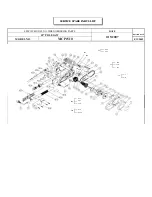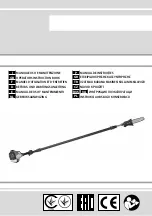
5
Failure to follow these rules may result in serious personal injury.
ADDITIONAL SPECIFIC SAFETY RULES
SAVE THESE INSTRUCTIONS.
Refer to them often and use them to instruct others.
1.
DO NOT OPERATE THIS MACHINE UNTIL IT IS
COMPLETELY ASSEMBLED AND INSTALLED
ACCORDINg TO THE INSTRUCTIONS. A machine
incorrectly assembled can cause serious injury.
2.
OBTAIN ADVICE from your supervisor, instructor,
or another qualified person if you are not thoroughly
familiar with the operation of this machine.
Knowledge is safety.
3.
FOLLOW ALL WIRINg CODES and recommended
electrical connections to prevent shock or
electrocution.
4.
SECURE THE MACHINE TO A SUPPORTINg
SURFACE. Vibration can cause the machine to slide,
walk, or tip over.
5.
NEVER START THE MACHINE BEFORE
CLEARINg THE TABLE of all objects (tools, scrap
pieces, etc.). Debris can be thrown at high speed
causing injury.
6.
NEVER START THE MACHINE WITH THE
WORkPIECE AgAINST THE BLADE. The
workpiece can be thrown, causing injury.
7.
NEVER START THE MACHINE UNTIL ALL
HANDLES ARE LOCkED AND THE BLADE IS AT
THE CORRECT TENSION. Abnormal operations
cause injuries.
8.
AVOID Awkward operations and hand positions. A
sudden slip could cause a hand to move into the
blade.
9.
kEEP ARMS, HANDS, and fingers away from the
blade to prevent injury.
10.
NEVER REACH UNDER THE TABLE while the
machine is running. A moving blade under the table
can cause injury.
11.
ADJUST THE "HOLD-DOWN" FOOT FOR EACH
NEW OPERATION. Loss of control of the workpiece
can cause injury.
12.
HOLD THE WORkPIECE FIRMLY AgAINST THE
TABLE. Loss of control of the workpiece can cause
injury.
13.
DO NOT CUT A WORkPIECE THAT IS TOO
SMALL TO BE SAFELY SUPPORTED. When hands
are too close to the blade, a wrong move can cause
injury.
14.
DO NOT CUT A WORkPIECE THAT DOES NOT
HAVE A FLAT SURFACE against the table.
15.
MAkE RELIEF CUTS before cutting long curves.
Never attempt to cut a curve that is too tight.
Breaking blades can cause injury.
16
. NEVER BACk A BOUND BLADE OUT OF A
kERF with the saw running. Turn the saw "OFF",
disconnect the saw from the power source, wedge
the kerf and remove the blade. Breaking blades can
cause injury.
17.
USE CAUTION WHEN CUTTINg IRREgULAR
WORkPIECES. This type of workpiece can pinch
the blade before the cut is complete. Breaking blades
can cause injury.
18.
USE CAUTION WHEN CUTTINg ROUND
MATERIAL. This type of workpiece has a tendency
to "roll" and can cause the blade to bite. Breaking
blades can cause injury.
19.
PROPERLY SUPPORT LONg OR WIDE work-
pieces. Loss of control of the workpiece can cause
injury.
20.
NEVER PERFORM LAYOUT, ASSEMBLY, OR SET-
UP WORk ON THE TABLE/WORk AREA WHEN
THE MACHINE IS RUNNINg. A sudden slip could
cause a hand to move into the blade. Injury can
result.
21.
TURN THE MACHINE "OFF", disconnect the
machine from the power source, and clean the table/
work area before leaving the machine. Lock the
switch in the "OFF" position to prevent unauthorized
use. Someone else might accidentally start the
machine and cause injury to themselves.
22.
ADDITIONAL INFORMATION regarding the safe
and proper operation of power tools (i.e. a safety
video) is available from the Power Tool Institute,
1300 Sumner Avenue, Cleveland, OH 44115-2851
(www.powertoolinstitute.com). Information is also
available from the National Safety Council, 1121
Spring Lake Drive, Itasca, IL 60143-3201. Please
refer to the American National Standards Institute
ANSI 01.1 Safety Requirements for Woodworking
Machines and the U.S. Department of Labor OSHA
1910.213 Regulations.






































